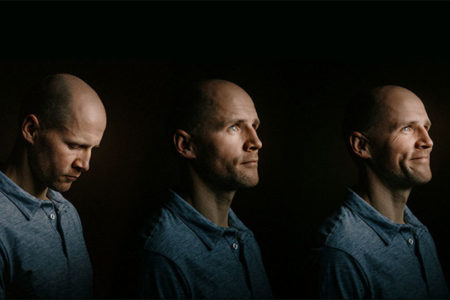Home to Eden
How Greek philosophy distorted God’s truth and how God’s plan of redemption brings everything full circle.
When you arrive in heaven, Saint Peter will greet you at the pearly gates with your eternal itinerary. You’ll receive your wings and a halo, take a seat on your white fluffy cloud, and play your golden harp for eternity. I’m joking, of course; but for many people, this scenario fits their definition of heaven.
When polled, two-thirds of Americans who claim to believe in the resurrection said they do not believe they’ll have physical bodies in heaven but think they will be disembodied spirits.1 They see eternal rest as an ethereal realm to which they’ll fly away after their souls are liberated from their bodies and the confines of this earth.
Is the eternal life Jesus promised in John 3:16 merely spiritual? Does going to heaven mean leaving this world behind forever and shedding our physical bodies for eternity? I can tell you this much: The biblical view of eternal life isn’t exactly how many 21st-century Westerners envision it.
Influence of Greek Philosophy
The separation of physical from spiritual derives from Plato, a fourth-century BC Greek who is considered one of the greatest philosophers of all time. Plato asserted that the physical world around us—what we see, hear, touch, and taste—is not actually real. He believed reality could only be found in the idea behind something. This is called the Theory of Forms (or Ideas).
According to Plato, every material substance on Earth, like our bodies or the chairs we sit on, represents a bad copy of the perfect idea in another world—where the perfect chair, for example, exists. Plato’s theory denies the reality of the material world, considering it merely an image or copy of the real world that does not exist here on Earth. For Plato, the body was a tomb for the soul. In most Greek philosophy, the body’s value pales in comparison to the human soul.
Plato believed everything of material value in this world is corrupt and that there is another world where everything is perfect and consistent.
Sound familiar?
Unfortunately, Plato’s philosophy grew legs. It left the fourth century BC and fused itself to the early church when Christian teachers and theologians appropriated Plato’s theory. For instance, Augustine, a fourth-century AD Christian theologian, said this of Plato: “I found that whatever truth I had read [in the Platonists] was [in the writings of Paul] combined with the exaltation of thy grace.” Augustine was taught a highly spiritualized (rather than literal) Kingdom-of-God theology, and Plato’s theory bolstered his ideas.2
The church allowed Plato and other Greek philosophers to influence biblical interpretation and, among other things, corrupt the Bible’s teaching about heaven. We must remember the Bible looks at the world through a Jewish lens, not a Greek one. For Jesus and the apostles, heaven and eternal life were physical realities. They were God’s creation, resurrected and restored.
The Biblical View
In contrast to Plato, God equally values the physical and spiritual. When He created the heavens and Earth, He stopped four times to see “it was good” (Gen. 1:10, 12, 18, 25). At the end of the sixth day, He saw everything He had created “was very good” (v. 31). God’s satisfaction reveals the value He places on His physical creation.
Our bodies and souls, according to Scripture, are not entirely separate entities, as Greek philosophy would have us believe. When God created Adam, He formed him from the dust of the earth and breathed the breath of life into his nostrils (2:7). Body and soul are uniquely knit together to form each individual.
One of the best pictures of heaven is found in the first two chapters of Genesis. After God completed His creation, Adam and Eve confidently walked with Him in the Garden of Eden. That scenario best defines heaven: It is where God physically interacts with His creation without restrictions due to sin. In fact, the modern Hebrew word for “heaven” means Garden of Eden. If you ask an Israeli if he is going to heaven, you’d be asking if he feels confident he’s going to the Garden of Eden.
Sadly, heaven in the first two chapters of Genesis was short-lived. Adam disobeyed God’s command, and Adam and Eve were banished from Eden, cut off from the Tree of Life, and separated from the Almighty’s presence. Their destiny changed from life to death, both spiritually and physically; and this spiritual and physical death was passed down to you and me.
All of God’s creation became infected with sin; and God, who is holy and cannot abide the presence of sin, no longer could physically walk amid His creation without imposing restrictions on it.
For this reason, God sent His Son. Jesus’ death and resurrection provided the way for God to interact with His creation without restrictions. The apostle Paul explained that the greatest demonstration of God’s love for His creation came while we were still sinners: God sent His Son to die for us so that we could be reconciled to Him (Rom. 5:10). In many ways, God’s plan is to bring us back to the Garden of Eden, where He will dwell freely with His creation. How does this happen? Resurrection!
The Christian Hope
If one verse defines the gospel with precision, it is John 3:16: “For God so loved the world that He gave His only begotten Son, that whoever believes in Him should not perish but have everlasting life.” When Jesus made this statement, He was pulling from the Hebrew Scriptures’ book of Daniel.
The prophet Daniel was told about the resurrection: “And many of those who sleep in the dust of the earth shall awake, some to everlasting life, some to shame and everlasting contempt” (Dan. 12:2). Those who die will one day “awake,” which means they will be resurrected. When they “awake,” they will either rise to “everlasting life” or everlasting condemnation.
Jesus highlighted Daniel again when He said, “And this is the will of Him who sent Me, that everyone who sees the Son and believes in Him may have everlasting life; and I will raise him up at the last day” (Jn. 6:40). Jesus equated everlasting life with bodily resurrection, not with a distant realm of perfection.
CAN WE STILL BELIEVE IN THE RAPTURE?
Take joy in the Lord’s promise to rapture the church in Can We Still Believe in the Rapture? by Ed Hindson and Mark Hitchcock.
Our hope as Christians is resurrection, meaning the fate of our bodies and souls is the same as that of Jesus when He came bursting out of the grave (Rom. 6:5). If we die before the Lord returns to rapture His church, our bodies will rise from the dead at the Rapture, be transformed from corruptible to incorruptible, and be changed from mortal to immortal in the twinkling of an eye (1 Cor. 15:52–53).
Even God’s creation is destined to be restored, redeemed, and resurrected. The apostle Paul wrote,
For the earnest expectation of the creation eagerly waits for the revealing of the sons of God. For the creation was subjected to futility, not willingly, but because of Him who subjected it in hope; because the creation itself also will be delivered from the bondage of corruption into the glorious liberty of the children of God (Rom. 8:19–21).
God’s creation longs for the “revealing of the sons of God,” another way of saying resurrection. It waits eagerly to be liberated and redeemed from the taint of sin.
The Bible ends by coming full circle back to Genesis, as the new heavens and new earth are being ushered in and the New Jerusalem descends to Earth (Rev. 21:1–3). God’s presence returns to His creation, as it was in the Garden of Eden. In the middle of the Holy City stands the Tree of Life, the same tree that stood in the midst of the Garden of Eden in Genesis 2. Heaven will be here on Earth after God resurrects His creation and His presence reigns. This is the eternal life Jesus promised.
If you’ve placed your faith in Jesus Christ, your soul will rest in God’s presence and in His care after you die. The apostle Paul said to be absent from the body is to be present with the Lord (2 Cor. 5:8). But being absent from the body is a temporary condition. God’s plan is to reunite your soul with your body at the Rapture; and at Christ’s Second Coming, you will return to Earth with Him.
Plato held an unbiblical view of the material world. God loves His creation and plans to redeem it in its entirety when the time is right. The heaven God has planned for us is where He will physically dwell with His creation without restrictions. There will be no sin, no shame, no guilt. It is where we will worship God for eternity, serve Him, and maintain His redeemed, physical creation.
ENDNOTES
-
- Shawn Nelson, “Christianity’s Platonic Heaven,” geekychristian.com, February 2013 [tinyurl.com/GeeKYC.]
- Michael J. Vlach, “Platonism’s Influence on Christian Eschatology,” mymission.lamission.edu [tinyurl.com/yy8fe8p2].









Loved your article.
Is the new Jerusalem on earth – its measures would indicate a cube larger than earth. Also in Eden there was a sun and moon – in the new heaven there is no need for the sun and moon. If heaven is Eden restored which I believe it is then it must be on a different dimension. We have resurrected bodies like Christ and the universe must be the scope of our enjoyment as Jesus was the creator of the universe. Interested in your response.
Great Article Chris thank you!